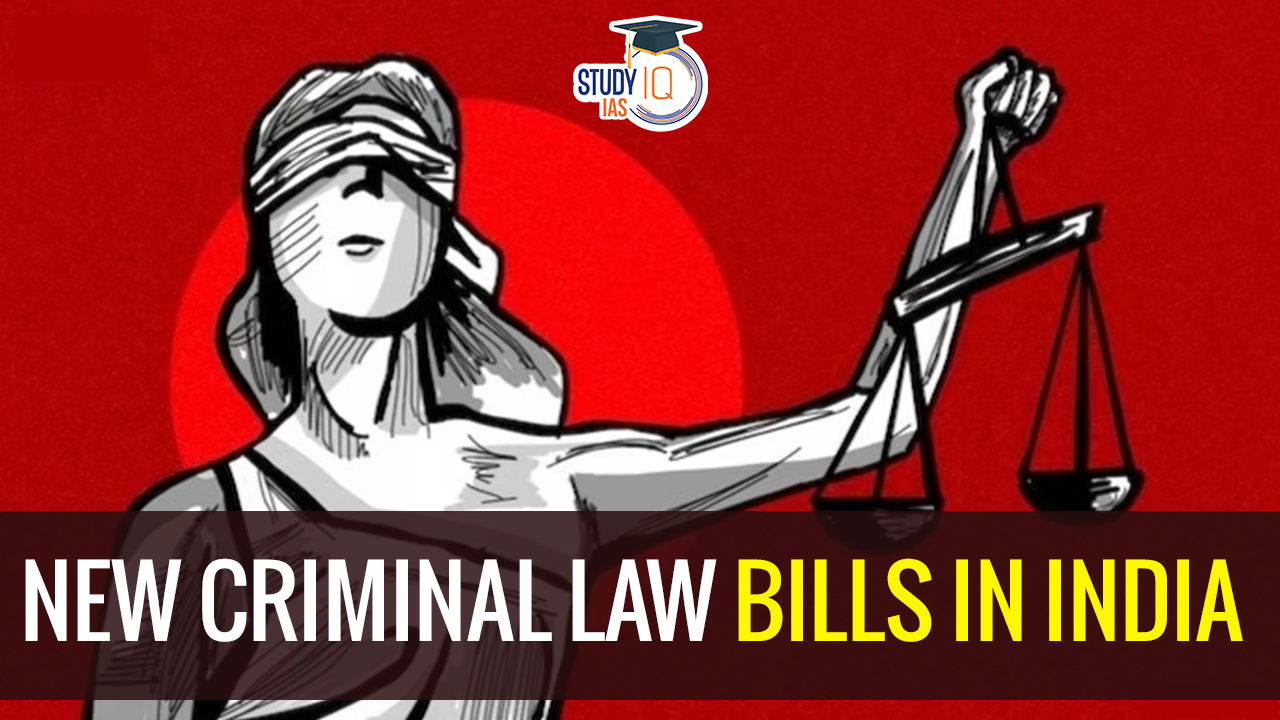Table of Contents
Context
- The new criminal laws have been implemented.
- SOPs have been issued by the Bureau of Police Research and Development (BPRD) to guide police officers in implementing the new provisions.
From July 1, three new criminal laws—Bharatiya Nyaya Sanhita (BNS), Bharatiya Nagrik Suraksha Sanhita (BNSS), and Bharatiya Sakshya Adhiniyam (BSA)—will replace the Indian Penal Code (IPC) of 1860, the Criminal Procedure Code (CrPC) of 1973, and the Indian Evidence Act of 1872, respectively. These changes aim to modernize and enhance the efficiency of the criminal justice system in India.
New Criminal Laws Came into Effect From 1st July
From July 1st, India introduces three new criminal laws: the Bharatiya Nyaya Sanhita (BNS), Bharatiya Nagrik Suraksha Sanhita (BNSS), and Bharatiya Sakshya Adhiniyam (BSA). These laws replace the Indian Penal Code (IPC) of 1860, the Criminal Procedure Code (CrPC) of 1973, and the Indian Evidence Act of 1872, respectively.
- BNS replaces IPC with 358 sections, introduces 20 new crimes, increases penalties for 33 offenses, enhances fines in 83 crimes, and includes a new chapter on crimes against women and children.
- BNSS replaces CrPC with 531 sections, includes 44 new provisions, and sets timelines for legal processes to expedite justice.
- BSA replaces Indian Evidence Act with 170 provisions, modernizing evidence procedures in courts, and repealing outdated provisions.
New Criminal Law Bills in India
On December 20, 2023, the Lok Sabha passed three new criminal law bills. These bills are intended to overhaul the Indian legal system and establish a “justice system based on Indian thinking”. These New Criminal Law Bills in India will replace the Indian Penal Code of 1860, the CrPC of 1973, and the Indian Evidence Act of 1872:
- Bharatiya Nyaya (Second) Sanhita, 2023
- Bharatiya Nagarik Suraksha (Second) Sanhita, 2023
- Bharatiya Sakshya (Second) Bill (BSB) 2023
Rules and Regulations of New Criminal Laws
Rules for Registering FIRs
- Zero FIRs:
- Officers in charge cannot refuse to register an FIR based on lack of jurisdiction.
- They are legally bound to register a zero FIR and transfer it to the respective police station.
- BNSS Section 173: Direct provision for zero FIRs.
- Penal action for non-registration.
- Modes of Filing FIRs:
- Information can be given orally, in writing, or by electronic means.
- Electronic information must be signed within three days by the informant.
- Sensitive information can be immediately enquired into by police.
- Accepted electronic means: Crime and Criminal Tracking Network & Systems (CCTNS) portal, police website, official email IDs.
Videography Requirements
- Mandatory Videography:
- Searches under Section 185.
- Scene of crime under Section 176.
- Process of search or possession under Section 105.
- eSakshya App:
- Developed by National Informatics Centre.
- Captures photos and videos, geo-tagged and time-stamped.
- Part of the Inter-operable Criminal Justice System (ICJS).
- Data accessible to judiciary, prosecution, and cyber forensic experts.
Provisions for Arrest
- Display of Arrest Information:
- Mandatory in police stations.
- Maintained by an officer not below Assistant Sub-Inspector.
- Includes names, addresses, and nature of offences.
- Restrictions on Arrest:
- Frail, sick, and elderly persons (above 60 years) require DySP permission for offences punishable with imprisonment less than three years.
- Cautious use of handcuffs as per Supreme Court guidelines.
| Prem Shankar Shukla V Delhi Administration 1980 |
Handcuffs are to be used only if a person is:
|
Timelines and Procedures
- Medical Examination:
- Section 184(6): Medical report of rape victims must be forwarded to Investigating Officer (IO) within 7 days.
- Investigation of POCSO cases to be completed within 2 months.
- Custody of Electronic Devices:
- Section 193(3)(h): Maintain sequence of custody for electronic devices.
- Emphasis on integrity due to vulnerability to tampering.
- Investigation Progress: Informant or victim to be updated within 90 days on the investigation progress.
Definition and Registration of Terrorist Acts
- Terrorist Act Definition– Section 113 of BNS: Duty of SP to decide on registration under this section or UAPA.
- Guidelines for SP:
- Consider if the organisation is notified under UAPA.
- Time needed for investigation.
- Rank of the IO and required scrutiny level.
- Danger posed by the accused.
Highlights of New Criminal Law Bills in India
On December 20, 2023, the Lok Sabha passed three significant criminal law bills aimed at replacing the Indian Penal Code 1860, the Code of Criminal Procedure 1973, and the Indian Evidence Act 1872. These bills, namely The Bharatiya Nyaya (Second) Sanhita 2023, The Bharatiya Nagarik Suraksha (Second) Sanhita 2023, and The Bharatiya Sakshhya (Second) Bill 2023 were highlighted by Union Minister of Home Affairs Amit Shah in his response speech. Here are the key highlights:
Bharatiya Nyaya (Second) Sanhita, 2023
- Definition of ‘Terrorist Act’: The Bharatiya Nyaya Sanhita (BNS) introduces a distinct offense for ‘Terrorist Act,’ covering acts that pose a threat to India’s unity, integrity, sovereignty, security, economic security, or spread terror among any group.
- Changes to ‘Sedition’: The offense of ‘sedition’ is eliminated, and BNS penalizes acts endangering the unity and integrity of India, replacing ‘Rajdroh’ with ‘deshdroh.’ The focus is on protecting citizens’ right to criticize the government while discouraging acts against the nation.
- ‘Mob Lynching’ as a Separate Offense: BNS introduces ‘Mob Lynching’ as a distinct offense, carrying a maximum penalty of death.
- Introduction of ‘Community Service’ as Punishment: Certain minor offenses now offer ‘Community Service’ as an alternative punishment to imprisonment.
- Compulsory Collection of Forensic Evidence: Provisions ensure the mandatory collection of forensic evidence during investigations, enhancing prosecution strength.
- Mandatory Audio-Video Recording of Victim Statements: Victims’ statements in sexual violence cases must be recorded through audio-video means for a comprehensive record.
Bharatiya Nagarik Suraksha (Second) Sanhita, 2023
- Appointment of Independent Director of Prosecution: Each district will have an independent Director of Prosecution to decide on appeals independently, irrespective of police or prosecution recommendations.
- Accountability of Police: Provisions are introduced to establish police accountability, fostering a more responsible law enforcement system.
- Victim-Centric Justice: Adjustments in the legal framework prioritize justice that considers the needs and rights of the victims.
- Zero FIR Registration: Victims can approach any police station, and the FIR will be transferred to the relevant station within 24 hours.
- Restrictions on State’s Withdrawal of Cases: Courts cannot allow the State to withdraw cases without hearing the victims.
- Timely Information to Victims: Victims must be served copies of the police report and informed about the investigation’s progress within 90 days.
- Electronic Mode for Inquiries and Trials: All inquiries and trials can be conducted in electronic mode, modernizing legal procedures.
Bharatiya Sakshya (Second) Bill (BSB) 2023
- Reorganization of Offenses: Offenses against the human body, women, and children are reorganized at the beginning of the BNS, with specific provisions for each category.
- Age Limit for Consensual Sex: The age limit for consensual sex with a wife is increased from 15 to 18 years.
- ‘Hit and Run’ Provisions: Punishment for ‘Hit and Run’ is up to 10 years imprisonment, with reduced punishment if the offender aids the victim after the accident.
- Exemption for Doctors from Death by Negligence: Doctors are exempted from the offense of death by negligence, addressing a request from the Indian Medical Association.
- Introduction of ‘Snatching’ as a Separate Offense: ‘Snatching’ is now recognized as a distinct offense.
- Stringent Punishment for ‘Grievous Hurt’: A separate provision is introduced for cases where the victim becomes brain dead due to ‘grievous hurt,’ prescribing more stringent punishment.
- Provisions Related to FIR, Chargesheet, and Trial: The BNSS introduces timeframes for FIR registration, preliminary investigation, further investigation, taking cognizance of chargesheets, and other trial-related processes.
- Trial in Absentia: If the accused does not appear within 90 days, trials can proceed in absentia.
- Release of Undertrials: First-time offenders may be released if undertrial detention reaches one-third of the sentence; in other cases, half of the period.
- Mercy Petition Against Death Penalty: Only convicts can file mercy petitions against death penalties; NGOs or third parties cannot file mercy petitions.
- E-FIR: Provisions are introduced for electronic registration of FIR, benefiting individuals hesitant to approach police stations, especially in cases of sexual violence.
- Video Recording During Search Procedures: Video recording is made compulsory during search procedures.
- Forensic Science Laboratory Team Visit: A forensic science laboratory team visit is made compulsory at crime scenes to ensure proper evidence collection.
- Witness Protection Scheme: A new witness protection scheme is introduced, with each state required to notify it.
- Sale of Seized Property: Courts can permit the sale of seized material objects and vehicles within 30 days, with video-photographic evidence.
- Inclusion of Electronic Evidence: Smartphone, laptop, messages, website, and locational evidence are included in the definition of proof.
- Uniform Hierarchy of Criminal Courts: The hierarchy of criminal courts is made uniform across the country, eliminating the classification of metropolitan areas and Metropolitan Magistrates.
Significance of New Criminal Law Bills in India
- Modernization: Replaces outdated laws – Indian Penal Code 1860, Code of Criminal Procedure 1973, and Indian Evidence Act 1872.
- National Security Focus: Defines ‘Terrorist Act’ separately, addressing threats to unity, integrity, and sovereignty.
- Freedom of Expression: Amends ‘Sedition’ laws, protecting citizens’ right to criticize the government.
- Social Concerns: Introduces ‘Mob Lynching’ as a distinct offense, addressing societal issues.
- Humanitarian Approach: Offers ‘Community Service’ as an alternative to imprisonment for minor offenses.
- Forensic Advancements: Compulsory collection of forensic evidence enhances prosecution capabilities.
- Victim-Centric Measures: Independent Director of Prosecution, mandatory audio-video recording of victim statements.
- Police Accountability: Fixes police accountability, promoting transparency in law enforcement.
- Legal Accessibility: Allows Zero FIR registration, enabling victims to approach any police station.
- Timely Justice: Timeframes for FIR registration, investigations, and trials expedite the legal process.
- Women and Children Protection: Prioritizes offenses against women and children, with specific provisions.
- Technological Integration: Includes electronic evidence, electronic FIR registration, and video recording during search procedures.
- Witness Protection: Introduces a Witness Protection Scheme for the safety and cooperation of witnesses.
- Efficient Asset Management: Allows the sale of seized property within a stipulated timeframe.
- Uniform Legal Hierarchy: Ensures uniformity in the hierarchy of criminal courts nationwide.
Criticism of New Criminal Law Bills in India
Critics of India’s new criminal law bills express concerns over potential human rights violations and the absence of safeguards against law enforcement excesses. Detractors argue that the bills introduce vague offences like “terrorism,” “organized crime,” and “endangering the sovereignty, unity, and integrity of India,” creating room for abuse.
Despite the bills’ intention to overhaul the criminal justice system, including the Bharatiya Nyaya (Second) Sanhita 2023, Bharatiya Nagarik Suraksha (Second) Sanhita 2023, and Bharatiya Sakshhya (Second) Bill 2023, critics fear these legislative changes may compromise individual rights and allow for undue law enforcement discretion.


 Places in News for UPSC 2025 for Prelims...
Places in News for UPSC 2025 for Prelims...
 List of Indian State Animals with their ...
List of Indian State Animals with their ...
 World Heritage Day 2025, Theme, Objectiv...
World Heritage Day 2025, Theme, Objectiv...





















